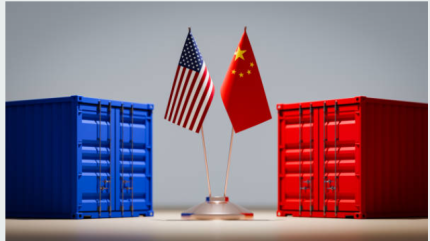
The United States and China have agreed to a temporary reduction in tariffs as part of an effort to de-escalate ongoing trade tensions. The 90-day pause, announced by the Trump administration, involves halting reciprocal tariffs that had reached as high as 125% on some imports.
The decision is intended to allow more time for continued trade negotiations between the two countries.

Discover B2B Marketing That Performs
Combine business intelligence and editorial excellence to reach engaged professionals across 36 leading media platforms.
The development was welcomed by the National Retail Federation (NRF), which described the move as a “critical first step” for retailers and businesses currently placing orders for the winter holiday season.
The temporary easing of tariffs is expected to reduce cost pressures on imported goods and may help stabilise consumer prices in the short term.
Impact on retailers and global supply chains
Retailers have been among the industries most affected by the tariffs, with increased import costs leading to higher prices and logistical challenges.
The 90-day suspension offers companies an opportunity to recalibrate their supply chains and potentially secure inventory without the added financial burden of elevated tariffs.

US Tariffs are shifting - will you react or anticipate?
Don’t let policy changes catch you off guard. Stay proactive with real-time data and expert analysis.
By GlobalDataAccording to the NRF, the timing of the pause is particularly important for businesses engaged in seasonal ordering. Many companies are preparing for end-of-year demand, and the relief may help cushion the impact of recent economic uncertainty linked to the trade dispute.
Tariff reduction seen as step towards fairer trade
The agreement to suspend tariffs temporarily follows months of escalating trade restrictions between the two countries, which had raised concerns across global markets.
The NRF stated that while this pause provides temporary relief, long-term goals must focus on creating balanced and fair trade conditions with not only China but also other major partners.
The current suspension affects only a portion of the tariffs imposed under national security provisions.
Business groups have called for further dialogue to address the broader issues at the heart of the dispute, including intellectual property rights, market access, and trade imbalances.
Future of trade negotiations remains uncertain
Despite the temporary reprieve, significant challenges remain in resolving the wider U.S.-China trade conflict.
Both sides have indicated a willingness to continue negotiations, but it is unclear whether a permanent agreement will be reached after the 90-day period concludes.
The NRF urged negotiators to use the window of opportunity to develop a sustainable framework for cooperation.
Market analysts are closely monitoring developments, as outcomes could influence global trade flows, manufacturing decisions, and economic growth forecasts.
The agreement comes at a time when trade policy remains a key topic in political and economic discourse, with tariffs and supply chain resilience ranking among the most searched and discussed terms globally.





